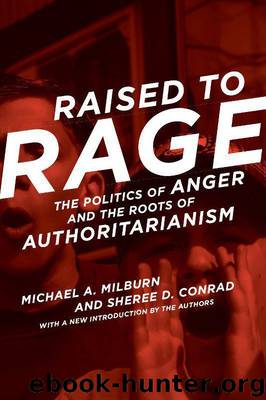Raised to Rage (The MIT Press) by Conrad Sheree D. & Milburn Michael A

Author:Conrad, Sheree D. & Milburn, Michael A. [Conrad, Sheree D.]
Language: eng
Format: epub
Publisher: The MIT Press
Published: 2016-08-07T16:00:00+00:00
Figure 6.1.
Average maximum heart rate (Milburn, Luster, and Fine 1994).
Wearing heart monitors, subjects viewed either the dramatic or the nondramatic versions of the tape, then wrote down what they could remember of the news stories and answered open-ended questions about United States–Korea trade relations or the situation in Cambodia. Figure 6.1 shows the average maximum heart rate recorded for the two groups while watching each of the five stories. Analysis of the results shows that exposure to the dramatic news stories has both direct and indirect effects on cognitive complexity. Exposure to dramatic news, in and of itself, produced a significant decrease in the cognitive complexity of subjects’ thinking, independent of measured emotion. In addition, the emotional arousal evoked by the dramatic news tape—as measured by heart rate—was correlated with a significant decrease in cognitive complexity. Thus, there appeared to be both a direct effect of the dramatic images—reduction of complex thinking—and a significant mediated effect on cognitive processing from the emotional arousal produced by the dramatic images. There was also a significant effect of increased heart rate on recall of verbal material; individuals who were exposed to dramatic news and reacted with increased heart rates remembered less about the stories they had seen than those who saw the nondramatic versions. The researchers concluded that exposure to dramatic news images, including violent scenes, has a negative effect on information processing, inhibiting both recall for the content of the news and complex thinking about the issues raised. They found some evidence that dramatic news produces these effects by arousing emotions that inhibit rational thinking.
What’s more, Milburn and McGrail found that the effects of dramatized news are particularly significant in individuals who rate themselves as politically conservative. Conservative individuals exposed to dramatic news scored significantly lower on recall and cognitive complexity than did more liberal subjects exposed to the same dramatic news. How are we to understand this difference? We saw in chapter 3 that severe childhood punishment predicts conservative views on a number of political issues, including the death penalty, abortion, and the use of military force. We suggested that individuals subjected to harsh punishment in childhood carry residual feelings of anger, fear, and helplessness from the punishment and that, in adulthood, they displace those negative emotions onto the political arena and advocate policies that allow them to express their anger—toward women seeking abortions, defendants accused of capital crimes, and other targets. If, as the research suggests, one of the effects of drama is arousal of emotional responses, and if conservatives carry residual negative emotions from childhood punishment, then graphic images of war, crime, and so on may awaken that residual anger and fear, which then interferes with information processing .
News and Childhood Experiences
A recent study from our lab in fact confirms the hypothesis that violent images on television can activate residual emotion from childhood and influence individuals’ perceptions of the world (Conrad, Casimira, and Milburn 1995). We showed one group of subjects a set of television news stories with violent, dramatic images, and another group a set of nonviolent news items.
Download
This site does not store any files on its server. We only index and link to content provided by other sites. Please contact the content providers to delete copyright contents if any and email us, we'll remove relevant links or contents immediately.
Rewire Your Anxious Brain by Catherine M. Pittman(18642)
Talking to Strangers by Malcolm Gladwell(13345)
The Art of Thinking Clearly by Rolf Dobelli(10450)
Mindhunter: Inside the FBI's Elite Serial Crime Unit by John E. Douglas & Mark Olshaker(9317)
Becoming Supernatural by Dr. Joe Dispenza(8199)
Change Your Questions, Change Your Life by Marilee Adams(7757)
Nudge - Improving Decisions about Health, Wealth, and Happiness by Thaler Sunstein(7689)
The Road Less Traveled by M. Scott Peck(7592)
The Lost Art of Listening by Michael P. Nichols(7488)
Mastermind: How to Think Like Sherlock Holmes by Maria Konnikova(7320)
Enlightenment Now: The Case for Reason, Science, Humanism, and Progress by Steven Pinker(7306)
Win Bigly by Scott Adams(7183)
The Way of Zen by Alan W. Watts(6600)
Daring Greatly by Brene Brown(6501)
Big Magic: Creative Living Beyond Fear by Elizabeth Gilbert(5754)
Grit by Angela Duckworth(5601)
Ego Is the Enemy by Ryan Holiday(5413)
Men In Love by Nancy Friday(5232)
The Laws of Human Nature by Robert Greene(5171)
